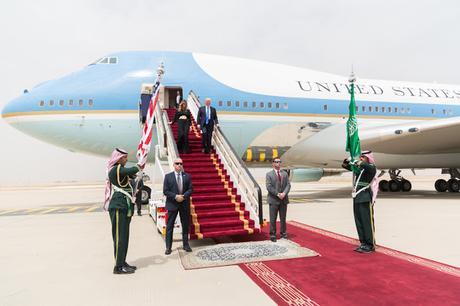 (This photo of Trump arriving in Saudi Arabia is from the White House website.)
(This photo of Trump arriving in Saudi Arabia is from the White House website.)We know that the second leg of Trump's foreign trip -- the European part -- was an unmitigated disaster. All it accomplished was to convince our European allies that while Trump is president, the United States cannot be trusted to meet its obligations or to continue its role as leader of the free world.
But some still tout the first leg of his trip -- to the Middle East -- as a success. One of the things they use to sell this is the $110 billion contract with the Saudis to buy American weapons. There's only one problem with that. There is no contract for the Saudis to buy more weapons. The Saudis did develop with Trump a wish list of weapons they might buy in the future, but no contract was signed and they are not under any obligation to actually buy those weapons.
Here is how Bruce Riedel puts it at the Brookings website:
Last month, President Trump visited Saudi Arabia and his administration announced that he had concluded a $110 billion arms deal with the kingdom. Only problem is that there is no deal. It’s fake news.
I’ve spoken to contacts in the defense business and on the Hill, and all of them say the same thing: There is no $110 billion deal. Instead, there are a bunch of letters of interest or intent, but not contracts. Many are offers that the defense industry thinks the Saudis will be interested in someday. So far nothing has been notified to the Senate for review. The Defense Security Cooperation Agency, the arms sales wing of the Pentagon, calls them “intended sales.” None of the deals identified so far are new, all began in the Obama administration.
Moreover, it’s unlikely that the Saudis could pay for a $110 billion deal any longer, due to low oil prices and the two-plus years old war in Yemen. President Obama sold the kingdom $112 billion in weapons over eight years, most of which was a single, huge deal in 2012 negotiated by then-Secretary of Defense Bob Gates. To get that deal through Congressional approval, Gates also negotiated a deal with Israel to compensate the Israelis and preserve their qualitative edge over their Arab neighbors. With the fall in oil prices, the Saudis have struggled to meet their payments since.
You will know the Trump deal is real when Israel begins to ask for a package to keep the Israeli Defense Forces’ qualitative edge preserved.
The other part of the trip that was touted as a success was Trump's speech in which he called for unity in the Arab world to fight terrorism. That much bragged about unity barely lasted until Trump got back to the United States. Riedel continues:
Finally, just as the arms deal is not what it was advertised, so is the much-hyped united Muslim campaign against terrorism. Instead, the Gulf states have turned on one of their own. Saudi Arabia has orchestrated a campaign to isolate Qatar. This weekend Saudi Arabia, the UAE, Bahrain, and Egypt broke relations with Qatar. Saudi allies like the Maldives and Yemen jumped on the bandwagon. Saudi Arabia has closed its land border with Qatar.
This is not the first such spat but it may be the most dangerous. The Saudis and their allies are eager to punish Qatar for supporting the Muslim Brotherhood, for hosting Al-Jazeera, and keeping ties with Iran. Rather than a united front to contain Iran, the Riyadh summit’s outcome is exacerbating sectarian and political tensions in the region.
It looks now like Trump's trip to Saudi Arabia was as unsuccessful as his trip to Europe. The idea of a successful foreign trip is nothing more than a figment of Trump's imagination -- another in a long list of lies he has told. There is no arms deal, and there is no unity. There is only Trump's continuing incompetence.

